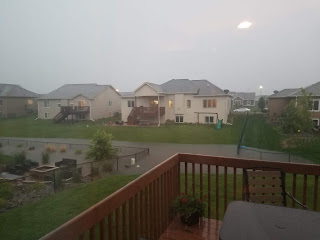The problem-
Many neighborhoods are designed to remove water from yards as fast as they can. Unfortunately that passes the buck, and the storm surge, downstream. This storm surge carries sediment and other pollution, contributes to flooding both regionally and localized. That was the case in this backyard in Ankeny.
This area of the yard was almost always wet, and the lawn could not be maintained. The grass was scraggly, bare and being overrun by water loving weeds.
The Plan-
Even though the city of Ankeny does Stormwater BMP Cost Share, having a dozen or so compacted yards draining through this area, a rain garden wasn't an option. That's just too much runoff for a single property to manage that way. So instead of trying to slow and sink that much water, we designed a functional & decorative dry stream bed including native plants, grasses and trees. The deep-rooted natives can act as a filter and help infiltrate rainwater into the ground during smaller rain events.
The Install-
Some light regrading was required to reestablish the slope running to the storm sewer inlet. The wet spot even tried to eat my Dingo! A combination of rock sizes were used to give the waterway a more natural look. A couple bigger boulders double as benches to watch the butterflies, and some others to cross the "stream." A native river birch won't mind the wet soil and provide dappled shade for the yard.
The Results-
The runoff and even floodwaters should pass through better and without damage now. The trouble spot in the lawn has become a decorative feature, that also provides habitat for native pollinators and a place to enjoy them. Two other native trees, swamp white oaks, were planted in the yard, along with a unique curly willow.
"The best time to plant a tree was 20 years ago,
the second best time is now"












No comments:
Post a Comment